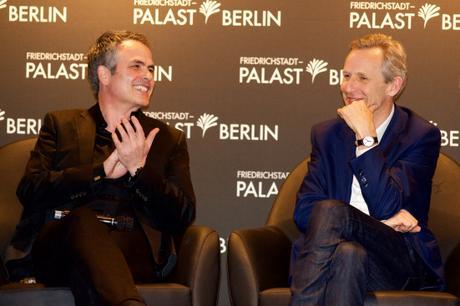Friedrichstadt-Palast – the glitzy show palace in Mitte – recently hosted an illuminating discussion about German and British theater.

Photo: Sascha Radke, Eventpress, courtesy of Friedrichstadt-Palast
The talk focused on the differences between British and German theater. Alistair Spalding, Artistic Director of Sadler’s Wells in London, observed that the British prefer to be entertained, while the Germans think theater has to be difficult and painful. Also, British theater is commercial, whereas German theatres are mostly subsidised.
This inevitably led to a discussion about the difference between art and entertainment. Does art have to be political? Dr Berndt Schmidt, General Director of Friedrichstadt-Palast, joked that although many people do not count what the Palast does as art, it must be – because they get funding for it.
He also stated that although the shows at Friedrichstadt-Palast were not political, the theatre’s attitude was open and tolerant. This is a fallacy: Everything is political. Even the choice not to engage in politics and just entertain people is political. It is a choice that says, the status quo is fine and we do not feel a responsibility or need to question it. That entertainment is more important than politics. It is conservatism of the highest degree.
The Palast’s current home on Friedrichstrasse was the last historic landmark building constructed in German Democratic Republic, in 1984. Under communist rule, the Palast’s shows were also used to entertain and placate. In Setting the Scene: Perspectives on Twentieth-Century Theatre Architecture, historian Florian Urban writes that the Palast hosted a selection of the regime’s most popular television variety shows, including Ein Kessel Buntes (A Cauldron of Potpurri); “the Saturday-night entertainment show with which East German rulers had, since 1972, attempted to win the acceptance of their subjects.”
The Palast’s shows supported the ruling order then, just as it supported the ruling order during the Nazi era, and it is – by choosing not to question contemporary society and politics – doing the same today. Luckily, we live in an open, democratic society, which is, apparently, the ‘general attitude’ of the Palast.
But how does the Palast’s ‘open and tolerant’ attitude manifest itself? When the director of Berlin’s largest theater was asked whether he actively sought to bring diverse voices from the city into his production-process, Berndt replied that he was not thinking about how many women or coloured faces there were in his theatre; he was just hiring people he thought were cool.
If you are not consciously thinking about tolerance, openness, and diversity, you cannot have an open, tolerant and diverse attitude. People naturally choose to work and socialise with people who are similar to them (see Scientific American’s article on how people socialise, or Business Insider’s article on the fact that managers hire people who remind them of themselves). Berndt is a white, middle-class man. If he is just picking people he thinks are cool, he is most certainly picking people who share his background or attitudes, which is not promoting diversity or tolerance but perpetuating a system of privilege and bias.
This system is the reason that no black actors were nominated for the Oscars this year. It is the reason that female hires in orchestras have risen by half since the introduction of ‘blind’ auditions for orchestras, where musicians must play behind screens that conceal their identities.
It is the reason the director of Ireland’s National Theatre came under fire at the end of last year when he announced a line up of 18 men and just two women writers and directors. In response to the criticism, he tweeted: “I don’t and haven’t programmed plays on a gender basis. I took decisions based on who I admired and wanted to work with.”
To deny gender-bias with such a line-up is ludicrous. The people he admired and wanted to work with were people like him – men. The work he connected to was the work that related to his experience – as a white, privileged male. It was only when he was made to think about it – by a counter movement supported by Meryl Streep and Wim Wenders – that he recanted his words. But his comment is one the Director of Friedrichstadt-Palast echoed: I’m just choosing people I think are cool. As a woman in the toilets said afterwards; “Well whoopee for him.”
Filed under: art, Berlin, events, Life in Berlin, people, theater
